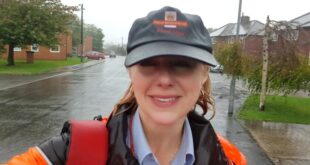Normally, it’s a big deal when a restaurant bakes its own bread. And so it should be: for that extra little bit of effort you can taste the difference immediately. Fresh-baked bread communicates something important – that this person cares about having you for lunch.
Dan Hunter goes one step further. Actually, he goes about 40 steps further. At Brae in Birregurra, Victoria, one of this country’s genuine culinary and accommodation treasures – the sort of place people will take a multi-day road trip specifically to visit – Hunter bakes bread. He bakes bread in an oven (built by the legendary Alan Scott) that’s a masterpiece of masonry radiating heat across its half-spherical arc, leaving the loaf evenly cooked and caramel-brown.
Before he bakes the bread he ferments it, like many bakers do. What most of them don’t do is mill their flour from fresh wheat, releasing the oils and esters that are normally oxidised before they ever reach the oven. He and his team sift the freshly milled flour by hand, around 25 kilos per day. Another thing that almost nobody else does is grow their own wheat. At Brae, there are 10 acres of wheat waving in the breeze – three different varieties, and occasionally a spelt.
Why make things intentionally difficult? Masochism? Hubris? Paranoia? Maybe. “I’m fearful of where a product comes from. If the best product in the world needs to travel 10,000 kilometres to get to your door, it isn’t the best product in the world anymore,” says Hunter. “If you’re at Brae, you know the wheat comes from 40 metres away.”
This gets to the heart of what Brae is all about. Six years ago Hunter and his partner Julianne Bagnato packed up and left Dunkeld, also in Victoria, where he was head chef at the Royal Mail. It was a great job. But Hunter needed something more.
“In the scheme of a whole lifetime, it wasn’t really that long ago in our life that Jules and I said we’d never own a restaurant,” says Hunter. “But the deeper we got into it, it was almost like there’s actually no option. I can’t continue to work at the highest level and do something wholeheartedly and with complete attention to detail without complete control – of both the positive and the negative. I just don’t think you can work for someone and give wholeheartedly to your guest. You’ll always make a compromise somewhere. And right now we don’t make any compromise. And we haven’t made a compromise for six years.”
The menu at Brae rolls with the seasons, and much of what’s on the plate is grown in the orchards or in the ground just outside the door. “It’s about understanding your product. It’s about understanding innately what you’re doing, and who’s involved in it,” Hunter says. “You get fed so much bullshit in restaurants. A produce-driven cafe on Chapel Street [in Melbourne]? Not a real thing. To be produce-driven is something that requires work. That’s integrity, you know? You’re bringing something to the table that’s real.”
Being genuinely produce-driven in the hard sense of the term requires two things. The first is a lot of planning. Only now are the 250 fruit trees on Brae’s property coming into their own, and these farmers are only just starting to get a feel for the land. “A lot of really long-term stuff has been put in place, and I guess over the next 10 to 15 years you’ll start to see them become really mature,” Hunter says. “ A lot of restaurants aren’t set up for the long game. They’re set up to capitalise and get out. This is hopefully a much slower burn.”
The other key ingredient is versatility. Serving a menu that’s genuinely dictated by the seasons means that you can’t serve everything all the time. “You never know the food you’re going to serve, and you don’t know what’s coming around the corner,” says Hunter. “But we had a very clear idea of the type of restaurant we wanted to be, of the feelings we wanted people to have when they came here. That meant the property and landscape, and the connection to outside, and to be part of a community, and to cook a cuisine that was truly of the place, not just in a PR statement.”
And, for Hunter, that connection can only come from having a true and deep and long-lasting relationship with the things that he’s serving. Like bread. Hunter understands this. “Developing a deep understanding of what appears to be a very simple process, and learning something new about it … it has a lot of value for me personally,” he says. “That bread you eat at Brae every day, we’ve considered all those things. We’ve been involved in that process, from start to finish.”
This article is produced by Broadsheet in partnership with Honda.

